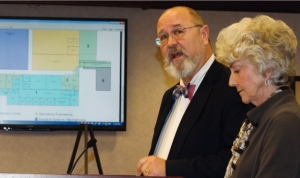County commissioners approve renovation plan
By Steve Herring
Published in News on January 12, 2016 1:46 PM

News-Argus/STEVE HERRING
Wayne Community College President Dr. Kay Albertson, right, and Don Magoon, WCC vice president of administrative services, brief the Wayne County Board of Commissioners on the proposal on proceeding on phase one and phase three of the WCC Advanced Manufacturing Center.
Wayne County commissioners last week approved an eight-phase renovation plan to convert the former Bussman plant building on Dixie Trail into the Wayne Community College Advanced Manufacturing Center.
They agreed, as well, to use the county's facilities department for phases one and three that basically covers the entry area of the building and will cost an estimated $470,761 with the county providing $53,437 over the next three years.
The county's portion includes $25,937 this budget year for cleaning above the lights, all the walls and floors and $1,794 to fence in access to electrical panels; $8,500 in 2017-18 to purchase a floor scrubber and $19,000 to paint the building's exterior.
The cost for all eight phases is estimated at $841,934.
A portion of the funding hinges on voters approving the proposed $2 billion statewide bond issue that will be on the March 15 primary ballot.
The equipment will cost about $2.1 million and will be paid mostly through WCC funds, County Manager George Wood said.
Commissioner Ed Cromartie noted that the $470,761 does not include the cost of the labor that will be provided by the county facilities department.
Including that cost would nearly double that amount, he said.
Wood said he was not sure of the exact amount, but agreed that having the county staff do the work would be a savings.
However, it would be a little misleading to say that $470,000 was the cost, Cromartie said.
Chairman Joe Daughtery said the board needed to realize that it is the county's responsibility to provide facilities for WCC.
"As such, if we have them going out and actually hiring individuals to produce that work, then we have to fund that," he said. "So it was a great compromise to see that we would use our resources and our personnel to do phase one and three to reduce the cost to the local taxpayers."
The building belongs to the Wayne County Development Alliance that has budgeted $98,246 for phases one and three.
"What we are asking today is that you proceed on with phases one and three which will be done by (facilities director) Kendall's (Lee's) forces," Wood said. "They (WCC) will then go out and hire an architect. We will not do that. At that point these other six phases will be done architecturally because there is enough complexity there that you have to use an architect by state law.
"Once we get that they will bid the items out at that point. So these estimates will be replaced by actual bids. Now some of these are depending on the bond, and we will just have to see if that passes in March. We do recognize, and I did put in the memo, if the bond doesn't pass, then we will have to revisit how we will pay for all of this."
WCC President Dr. Kay Albertson and Don Magoon, WCC vice president of administrative services, briefed the board on the proposal.
Commissioner Wayne Aycock said state laws governing community colleges are different from those for county government.
Aycock said he has concerns about the process, and that he thinks information that commissioners received earlier on should have been better researched.
Also, Aycock said he did not think the WCC board of trustees had been involved enough in the decision-making process.
The original figures had included a "wish list," but the list before commissioners for consideration does not include that list, she said.
"We don't need to count this bond money until we get it," he said. "I think the bond will pass, but until March when it comes to a vote, I want to be very careful how we spend the money. I want to make sure this facility is functional.
"Naturally I want it to look appealing, but the stress of what we need to do needs to be put on the inside to benefit the students and not necessarily benefit the outside of the building."
The plan does not turn the building into a Taj Mahal, but the reception area is a "front-door experience" for any company that might be looking at the county, Mrs. Albertson said.
Phase one is the front office area of the building, Magoon said.
"It will house the Business and Industry Center, the Small Business Center, the Military Business Center, our customized industry training, WORKS program and soft skills training components," he said.
Phase 3 includes common space for students, a lounge area, open computer lab, and the student entrance, updating lighting fixtures, parking lot repairs, exterior lighting and the main restrooms, he said.
"So we want to get them done early in the project if we can, before we start bringing students in," he said.
Having the county do the interior work will save both time and money, Magoon said.
"Phase two would encompass our welding program," he said. "We moved that up to phase two because of some grant opportunities that came about. Phase four is our heating and air conditioning program. Phase five would be our mechanical engineering program. Phase six would be industrial systems and mechatronics.
"Phase seven is computer-integrated machining, and if we needed additional classrooms, we would add those at that time. Phase 8 incorporates a number of other items including final upfits for things like the shipping and receiving dock and various service areas."
